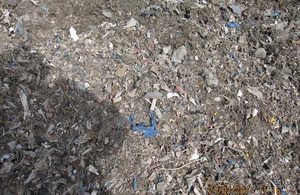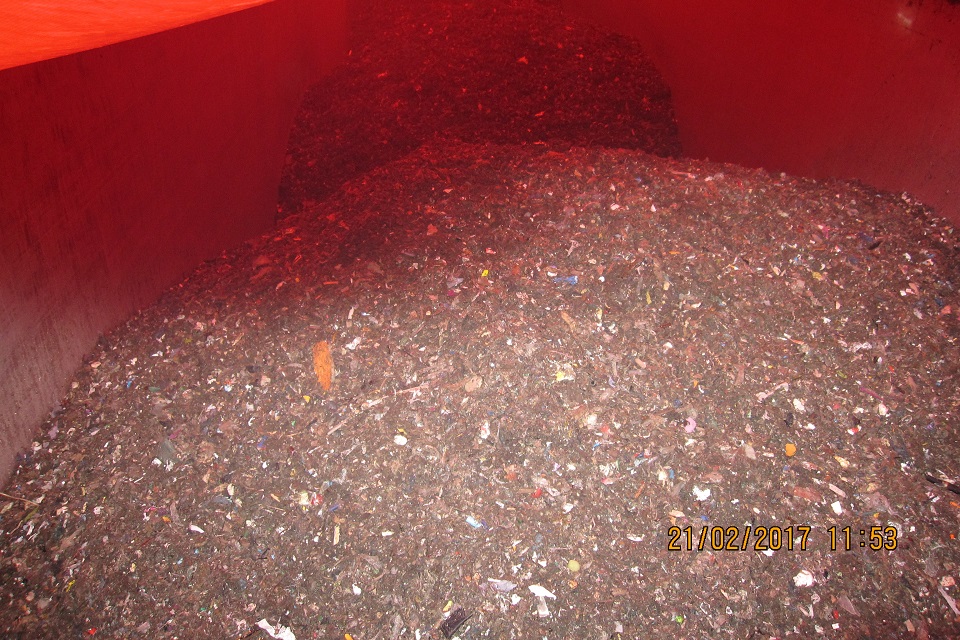North East company directors in court for serious waste offences
Three men have been banned from acting as company directors for five years following an Environment Agency investigation into waste offences.

The shredded mixed waste which was mis-described as soil
Three North East men have been banned from acting as company directors for five years after they allowed unpermitted and mis-described waste to be deposited on their firm’s land at Bishop Auckland to avoid the costs of legal disposal.
Appearing at Peterlee Magistrates’ Court on Tuesday 5 October, John Anthony Wood, 54, of St James Fields, Castle Eden, pleaded guilty to neglecting to ensure the conditions of an enforcement notice to remove illegal waste from the site was adhered to, while David Langhorne, 58, of Beaconsfield Street, Hartlepool, pleaded guilty to the same offence as well as a separate charge of neglecting to ensure the company complied with its own management systems in relation to pollution prevention.
John Bernard Charles Campbell, 60, of Studland Road, Redcar, Cleveland, had previously pleaded guilty to neglecting to ensure the conditions of an enforcement notice to remove illegal waste from the site was adhered to, consenting to the company not complying with its own management systems in relation to pollution prevention and a third change of consenting to receive and deposit waste not authorised by the permit.
All three were sentenced on Tuesday (October 5). As well as being fined a total of more than £2,500 and ordered to pay costs amounting to £16,000, they were disqualified from acting as company directors for five years.

The shredded mixed waste which was mis-described as soil
Offences perpetrated for ‘financial gain’
An Environment Agency spokesperson said:
We take a hard line against anyone that intentionally sets out to profit from flouting laws which are in place to protect the environment and communities.
The company’s permit was issued to allow suitable and authorised waste to manufacture a soil. Instead, shredded waste containing plastic, card and wood was deliberately imported, described as soil, and deposited on the company’s land, which in one area had already been covered with a soil cap.
This criminal behaviour was motivated by a willingness to attract business from those companies prepared to travel large distances to avoid paying landfill tax.
During sentencing, the judge noted that the offences were perpetrated for financial gain at a potentially huge environmental cost. The land here was not designed for waste such as this and their actions could have had a really detrimental impact on the environment, as well as undermining local waste operators.
Mixed waste mis-described as soil
The court heard that the three were company directors of the Viridis Group Ltd, which had two environmental permits for a waste transfer station and the manufacture of soil from waste facility at the Old Brickworks at Eldon, Bishop Auckland. The company ceased trading at the end of 2018.
On 21 February 2017, Environment Agency officers visited the site and saw attempts by a vehicle to deposit shredded mixed waste next to an area designated as the soil manufacturing facility. Paperwork from the driver described the waste as ‘soil’, which would attract a lower rate of landfill tax. Officers stopped the mis-described waste from being tipped and noted that a large amount of shredded waste products – around 17,000 cubic metres - rather than soil was on the site, which was a breach of the company’s permit.
Investigations showed the waste mis-described as soil came from Lincolnshire, Lancashire, Staffordshire, Cumbria and Scotland.
In April 2017 an enforcement notice was issued by the Environment Agency to have the illegal waste removed, but this was not complied with. In the months that followed, the waste, which was dumped on land not authorised or engineered to manage polluting wastes, started to smell and produce a leachate, impacting on the environment.
In sentencing, Wood was fined £700, ordered to pay costs of more than £5,000 and a £70 victim surcharge; Langhorne was fined £1,174, ordered to pay £5,500 in costs and a victim surcharge of £66, and Campbell was fined £640, ordered to pay costs of more than £5,000 and a victim surcharge of £34.